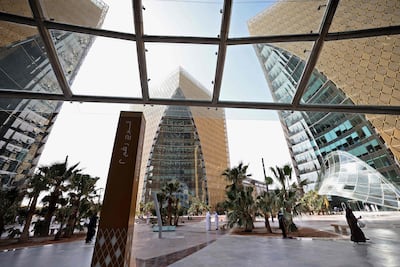GCC countries are likely to reap about $23.5 billion in economic benefits by 2030 as investments in generative artificial intelligence continue to grow, a new report has found.
Saudi Arabia and the UAE are set to benefit the most from the growth in the emerging technology, PwC unit Strategy& Middle East said in a report on Thursday.
Saudi Arabia is projected to benefit the most from generative AI's “extraordinary” potential economic impact in the region, underpinned by growing investments in the region, according to the consultancy.
The region could realise about $9.9 of economic growth for every $1 invested into the technology, the pace of which could unlock $23.5 billion per year by 2030, it said.
The kingdom, which has been heavily investing in its technology ecosystem, is projected to reap more than half of that amount, or $12.2 billion.
The UAE, which has also been boosting its initiatives to adopt the latest innovations, has the next biggest potential with $5.3 billion, the report found.

Estimated economic gains for the rest of the GCC countries are $2.6 billion for Qatar, $1.6 billion for Kuwait, $1.3 billion for Oman and $600 million for Bahrain.
“These statistics underline the extraordinary potential of generative AI to revolutionise the Middle East's business landscape,” said Tony Karam, partner at Strategy& Middle East, wrote in the report.
“Executives who seize this opportunity without delay can gain a substantial competitive advantage, while companies that merely watch risk falling behind.”
AI has long been used by businesses in their operations, but it has gained momentum with the advent of generative AI.
The technology – made popular by ChatGPT, created by Microsoft-baked OpenAI – can produce various kinds of data, including audio, code, images, text, simulations, 3D objects and videos.
Investors have put more than $4.2 billion into generative AI start-ups in 2021 and 2022 through 215 deals after interest surged in 2019, recent data from CB Insights showed.
This has prompted countries to tap into its potential. Saudi Arabia and the UAE, the Arab world's biggest economies, have introduced several initiatives to promote the use of technology as they prepare for the future economy.
Companies in the kingdom are moving faster when it comes to adopting cutting-edge technologies compared to their global counterparts, consultancy KPMG said in a recent report.

In the UAE, nearly three in four companies and organisations have either maintained or increased their investment in AI initiatives in recent months, technology company Dataiku said in a report in May.
Major technology companies are also taking notice of the region's potential.
On Thursday, Alphabet-owned Google launched its generative AI platform Bard in Arabic to address the needs of native speakers.
On a global level, the growing adoption of AI technology can help boost economic growth and raise labour productivity, Goldman Sachs said in a previous report.
Widespread AI adoption can eventually grow annual global gross domestic product by 7 per cent in the 10 years after at least half of companies worldwide begin using AI technology, the US bank said.
“Success in generative AI hinges upon talent acquisition … in this global race for talent, establishing robust strategic partnerships is imperative for GCC companies aiming to swiftly deploy experienced talent and capabilities,” Mr Karam said.
“Simultaneously, cultivating an environment that attracts and retains top-tier in-house data science talent is crucial.”
Sector-wise, the GCC's media and entertainment industry is projected to record the biggest transformation as a result of using generative AI, with an estimated economic of $8.5 billion, Strategy& said.
This is followed by health care ($3.8 billion), banking and financial services ($3.5 billion), and IT and telecoms ($2.9 billion).
However, the study cautioned that generative AI is not without its risks and regulatory concerns, including the threat of deepfakes, harmful content and exacerbated economic inequality and bias.
Despite this, the technology’s expected economic impact remains substantial, and organisations must address these challenges to unlock generative AI's full and positive potential.
partner at Strategy& Middle East
On the executive level, chief executives have to collaborate with their chief data, information and technology officers to quickly address any shortcomings in their companies' data capabilities, especially those linked to data governance, Strategy& said.
“Generative AI now signifies a revolutionary force that is poised to redefine the business landscape. Its true potential can help propel organisations to the forefront, endowing early adopters with a formidable competitive advantage,” it said.


